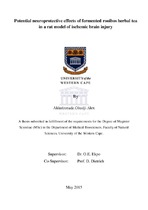| dc.contributor.advisor | Ekpo, O.E. | |
| dc.contributor.advisor | Dietrich, D. | |
| dc.contributor.author | Akinrinmade, Olusiji Alex | |
| dc.date.accessioned | 2016-01-05T10:19:15Z | |
| dc.date.available | 2016-01-05T10:19:15Z | |
| dc.date.issued | 2015 | |
| dc.identifier.uri | http://hdl.handle.net/11394/4705 | |
| dc.description | Magister Scientiae (Medical Bioscience) - MSc(MBS) | en_US |
| dc.description.abstract | Stroke is the third leading cause of death in South Africa, killing about 240 people a day and leaving survivors with residual disabilities. There is no clinically approved neuroprotective agent for stroke at the moment but the consumption of plant polyphenols has been suggested to offer neuroprotection against stroke and other neurodegenerative diseases. In this study, we investigated the effects of long term consumption of fermented rooibos herbal tea (FRHT) on ischemia reperfusion brain injury (I-RBI) in rats. Male adult Wistar rats were fed FRHT ad libitum for 7 weeks prior to the induction of ischemic injury by the transient bilateral occlusion of the common carotid arteries (BCCAO) for 20 minutes followed by 24 hours, 4 and 7 days of reperfusion respectively. Rats were then evaluated for neurologic deficits
before sacrifice and brains harvested for assessment of brain oedema, blood-brain-barrier (BBB) integrity through Evans blue extravasation (EBE), immunohistochemical studies of apoptosis and lipid peroxidation. Oxygen radical antioxidant capacity and ferric reducing antioxidant power assays were also conducted to assess total antioxidant capacity after ischemia-reperfusion injury. Notably, the long term consumption of fermented rooibos herbal tea prevented brain oedema by reducing cerebral swelling induced by I-RBI. We also observed that fermented rooibos herbal tea offered neuroprotection against damage to the
BBB and delayed neuronal death associated with BCCAO as fewer apoptotic cells were identified 7 days post BCCAO reperfusion. Significantly reduced levels of lipid peroxidation and increased levels of total antioxidant capacity were also observed in brain specimens of rats treated with FRHT. Rats treated with FRHT also showed improved neurologic outcomes when compared with the untreated animals. Our results show that FRHT has potent antioxidant and anti-inflammatory properties which can provide neuroprotective effects against neuronal cell loss, cerebral swelling, BBB disruption, lipid peroxidation and neurologic deficits following I-RBI. The use of FRHT is therefore highly recommended for patients with conditions that predispose them to stroke. | en_US |
| dc.language.iso | en | en_US |
| dc.publisher | University of the Western Cape | en_US |
| dc.subject | Stroke | en_US |
| dc.subject | Cerebral ischemia | en_US |
| dc.subject | Bilateral common carotid artery occlusion | en_US |
| dc.subject | Ischemia-reperfusion injury | en_US |
| dc.subject | Brain oedema | en_US |
| dc.subject | Fermented rooibos herbal tea | en_US |
| dc.subject | Antioxidants | en_US |
| dc.title | Potential neuroprotective effects of fermented rooibos herbal tea in a rat model of ischemic brain injury | en_US |
| dc.rights.holder | University of the Western Cape | en_US |

